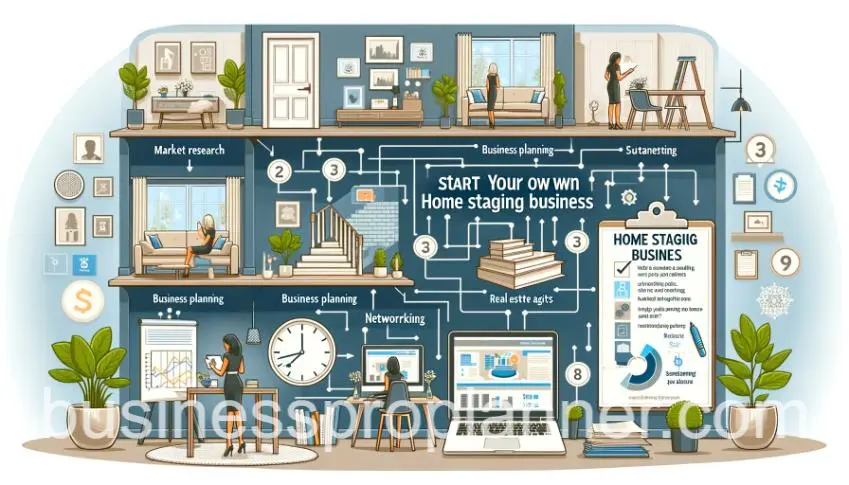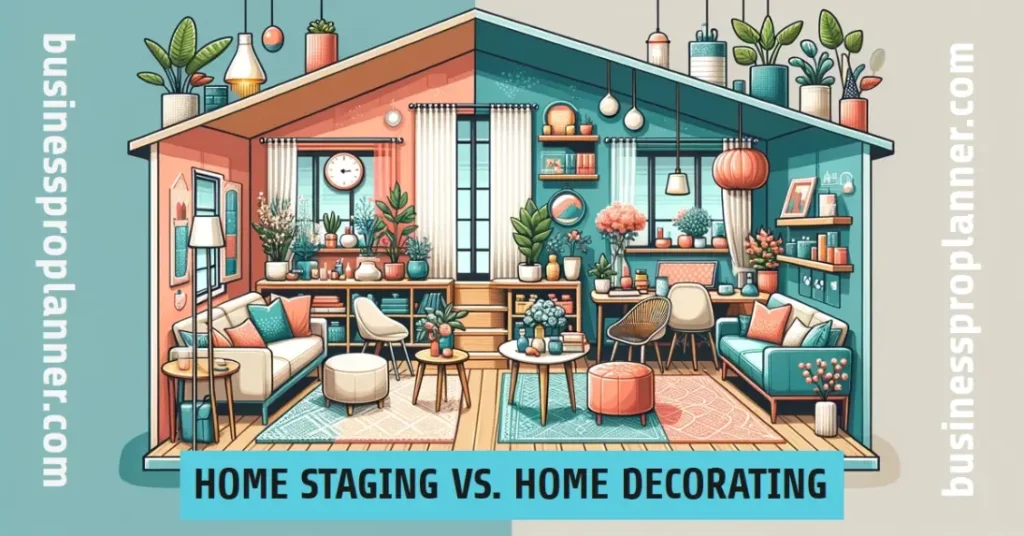Stepping into the world of home staging is a venture that combines artistic flair with savvy business acumen. For those pondering how to start a home staging business, it’s more than just arranging furniture, it’s about creating a vision that sells. As a home stager, your role extends beyond mere decoration, it’s about enhancing a property’s appeal to entice potential buyers in the real estate market.
Starting a home staging business allows you to help sellers prepare their homes for sale by making improvements and showcasing the property’s best features. A successful home staging business takes careful planning, preparation, and hard work.
In this blog post, I will walk through the step-by-step process of how to start a successful home staging business from the ground up. Follow these key steps to launch your own home staging company.
Key Takeaways
- Research the home staging industry and local competitors
- Create a detailed business plan
- Obtain necessary licenses and permits
- Set up the legal structure and register your business
- Get business insurance
- Develop relationships with real estate agents
- Undergo home staging training and get experience
- Purchase home staging supplies and equipment
- Market your new home staging business

Step 1: Research the Home Staging Industry
Before launching a home staging business, spend time learning about the industry. Here are some key areas to research:
- Home Staging Overview: Learn what home staging is, its benefits, and why it’s an important service for home sellers. Understand the role and responsibilities of a home stager.
- Industry Size and Growth: Research facts and figures on the size of the home staging industry and its growth. This will help gauge overall demand.
- Home Staging Associations: Look into leading professional associations like the Real Estate Staging Association (RESA) and the International Association of Home Staging Professionals (IAHSP) that support home stagers through training, certification, and other resources.
- Competitor Analysis: Identify other home staging businesses in your local area. Analyze their services, prices, website, marketing, and areas of specialization to determine how to differentiate your business.
- Home Staging Trends: Study current and emerging trends like virtual staging, DIY staging, staging on a budget, and staging only certain key rooms. Use trends to specialize and stand out.
Conducting thorough industry research will provide the foundation to create a viable, competitive home staging business tailored to your local real estate market.
Step 2: Create a Detailed Business Plan
After researching the market opportunity, develop a comprehensive business plan covering all aspects of starting and operating your home staging company.
Include sections on:
- Executive summary
- Company description and objectives
- Services and pricing
- Market analysis and competitive assessment
- Marketing and sales strategies
- Operations plan
- Financial projections
- Funding needs and sources
Having a well-researched business plan is crucial for successfully launching and managing a profitable home staging company. It will also be necessary if you need to secure business financing or investors.
Step 3: Obtain Necessary Licenses and Permits
Make sure to obtain all required licenses and permits to legally operate your home staging business:
- Business License: Register for a general business license in your state and city/county. Requirements vary but often just involve filing paperwork and paying fees.
- Sales Tax Permit: If selling home staging supplies/services, you’ll need a permit to collect and remit sales taxes.
- Zoning Permit: Some areas may require home-based businesses to get a home occupation or zoning permit. Check with your local zoning department.
- Insurance Licenses: If providing insurance services, obtain the necessary insurance licenses.
Complying with licensing and permit regulations is essential to avoid penalties and potential business closure. Consult local government departments to determine all requirements.
Step 4: Set Up the Legal Structure and Register Your Business
Decide how to legally structure your home staging business. Common options include:
- Sole Proprietorship: Simple and inexpensive but you’re personally liable.
- LLC or Corporation: More complex but limits personal liability.
- Partnership: For two or more owners who share management and profits.
Choose the structure that makes the most sense for your business situation and goals.
Also officially register your business name and obtain an EIN from the IRS. This establishes the legal entity of your business for taxes and other transactions.

Step 5: Get Business Insurance
Acquire adequate business insurance to protect your home staging company. Recommended policies include:
- General Liability Insurance: Covers damages if a client claims you caused property damage or injury.
- Errors and Omissions Insurance: Protects against claims of poor advice or negligence.
- Workers’ Comp Insurance: Required if hiring employees to cover workplace injuries.
- Business Property Insurance: Covers company-owned equipment in case of theft or damage.
Shop around and compare plans from various providers to get the best rates.
Step 6: Develop Relationships with Real Estate Agents
Building strong relationships with real estate agents is vital for getting home staging clients. Here are some tips:
- Network at industry events and join local real estate associations.
- Cold call/email agents and offer free staging consultations.
- Stage open houses for agents to showcase your skills.
- Offer referral fees to agents who recommend and hire you for staging jobs.
- Partner with new agents looking to establish their business.
- Send periodic emails showcasing your recent staging projects.
Focus on providing excellent service and results for agents to generate ongoing referrals.
Step 7: Undergo Home Staging Training and Gain Experience
Invest in proper home staging training to acquire the necessary skills and expertise. Options include:
- Home staging certification courses from professional associations like IAHSP and RESA.
- In-person workshops and online classes are offered by experienced home stagers.
- Interior design, decorating, or real estate courses that cover staging principles.
- Books, blogs, podcasts, and videos on home staging best practices.
Also seek opportunities to gain hands-on staging experience such as apprenticeships, internships, assisting other stagers, or staging your own/friends’ homes.
Step 8: Purchase Home Staging Supplies and Equipment
Home stagers need certain supplies and equipment to perform staging services. Essential items include:
- Basic toolkits with supplies for minor repairs and installation
- Furniture, lighting, rugs, artwork, and home decor items to furnish staged homes
- Digital camera to take listing photos of staged homes
- Transport vehicle like a van to move larger furnishing items
Build up your home staging inventory gradually as your business grows. Buy cost-effective items from thrift stores, wholesalers, and estate sales.
Step 9: Market Your Home Staging Business
Use various techniques to market and promote your home staging services:
- Develop a professional website showcasing your services.
- Distribute brochures and flyers to local real estate offices.
- Promote your business through social media platforms.
- Network and present at events for real estate professionals.
- Offer promotions and discounts to new clients.
- Get certified by leading home staging associations to boost credibility.
- Advertise in industry publications and directories.
A steady marketing strategy will help attract clients and establish your reputation. Focus on the unique value you provide through your staging services.
Home Staging vs. Home Decorating

| Home Staging | Home Decorating |
|---|---|
| The objective is to prepare a home for sale | The objective is to create an aesthetic living space |
| Focuses on enhancing marketability and appeal | Focuses on personal style and preferences |
| Highlights the home’s best features | No constraints on design choices |
| Uses neutral colors and styles | Can use bold colors and statement pieces |
| Minimizes clutter and personal items | Can incorporate personal memorabilia |
| Stages every room, even unused spaces | May only decorate certain rooms |
| Budget-conscious furniture and decor | Can splurge on higher-end items |
| Temporary furniture placement | Permanent furniture arrangement |
Wrapping Up
In conclusion, venturing into the home staging industry offers a gratifying blend of creativity and business savvy. For those inspired to start a home staging business, the journey involves much more than just a keen eye for home decor. It’s about crafting spaces that resonate with potential buyers and understanding the dynamics of the real estate market.
A successful home stager is not only a skilled decorator but also a shrewd small business owner. From selecting an appealing business name to establishing key relationships with real estate agents, every step is crucial. Remember, obtaining a business license and ensuring proper business insurance is just as important as the creative aspect of staging a home.
As the real estate market continues to evolve, so does the role of home staging businesses. This career path offers endless growth opportunities, both personally and professionally. Whether you are starting your own home staging business or looking to expand your services, the future is bright for those with passion and dedication in this dynamic field.
